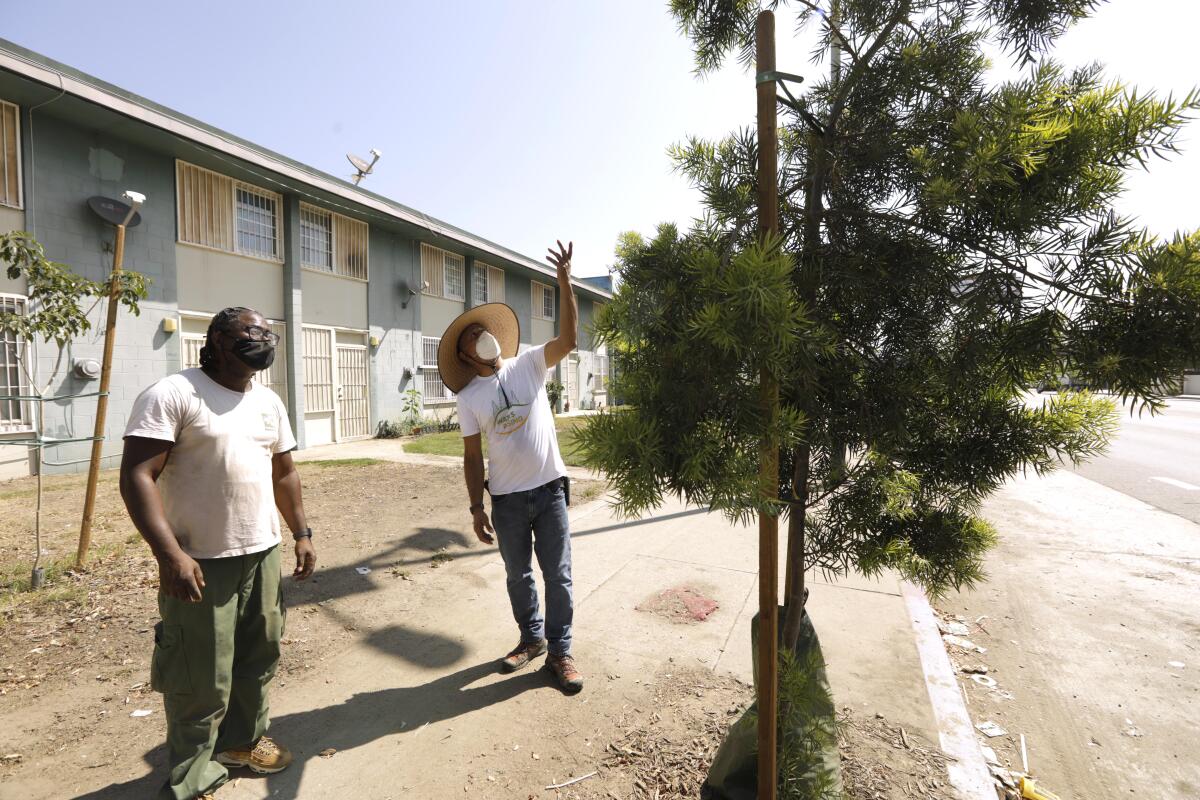Letters to the Editor: City Hall fails to protect L.A.’s existing trees. Why does it want 90,000 new ones?

- Share via
To the editor: As a 20-plus-year board member of TreePeople, Southern California’s preeminent leader in tree preservation and propagation, I was filled with despair reading your article, “L.A. needs 90,000 trees to battle extreme heat. Will residents step up to plant them?”
Aside from the throw-away reference to older trees being cut down by developers, there was nothing cohesive or rational about what the city’s real problems are with respect to the serious and unsustainable treatment of trees in Los Angeles.
Notwithstanding the illegality of doing so, developers mow down trees, protected or not, that are standing in their way with almost comical impunity. Short of costly and protracted legal battles by people who want to save our city’s tree canopy, almost nothing is ever actually done to stop this.
L.A.’s Urban Forestry division, when informed of illegal tree cutting, rarely does anything to stop it. It’s absurd to expect citizens to fix the problem when the agency charged with doing so won’t.
The city’s scattershot approach to mitigating our dearth of essential tree canopy is scandalous. I just hope the next mayor and City Council have a clue about what to do. Hint: Call TreePeople.
Sara R. Nichols, Los Angeles
..
To the editor: Serving on the Neighborhood Council Sustainability Alliance’s Tree Committee, and being a Sierra Club leader, I was thrilled to see your article on the need to plant more trees in our urban landscape.
While humans need trees to thrive during heat spikes, other species rely on them too. Residents grow milkweed to help the Monarch butterfly survive, but it also needs trees for protected night-time roosting. The Mourning Cloak butterfly needs trees too, specifically Chinese elm and willow trees.
Neotropical migratory songbirds travel through Southern California. Without trees, the Pacific Flyway will be severely diminished, as will our resident bird populations.
One trouble with our tree-care habits is that, once trees are planted, severe “trimming” occurs, often weakening and eventually killing them. Yes, let’s plant the trees, but let’s also allow them to flourish as nature intended.
Marcia Hanscom, Playa del Rey
..
To the editor: It’s admirable that the city wants to plant all these trees, but it is pedaling backward. Witness the completely irrational blind eye the city turns to developers clear-cutting hillsides of mature trees to make room for mega-mansions.
We cannot re-plant our way out of this situation. The “replacement” saplings will take decades to reach maturity, and many will not survive. The city is rightly seeking canopy equity across the city; in that case, it should know that the Westside is losing trees rapidly.
If the city is really serious about increasing the urban canopy and cooling our ever-hotter Los Angeles, it is only common sense that we must start with preserving our current inventory.
Emily Loughran, Los Angeles




